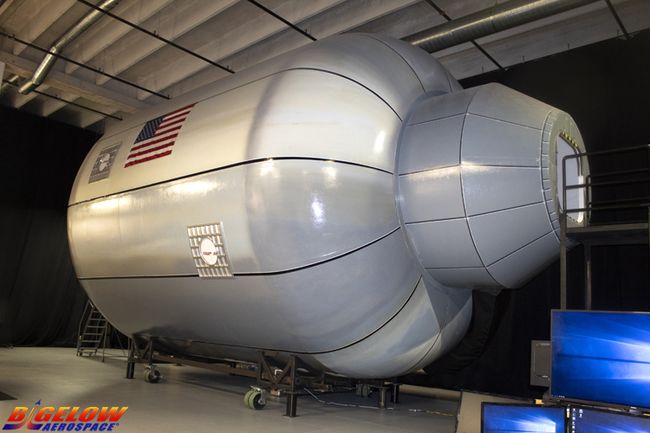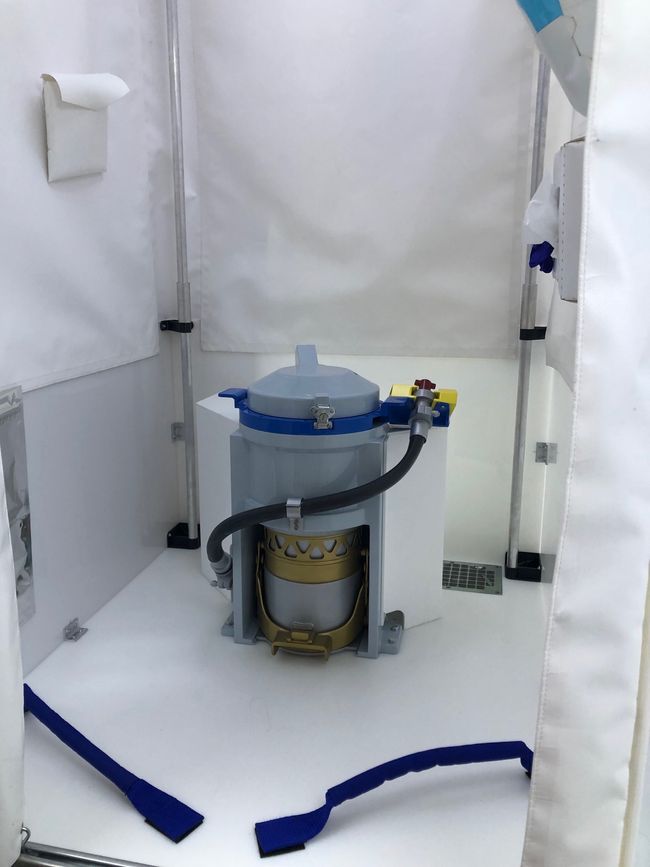New Mars Forums
You are not logged in.
- Topics: Active | Unanswered
Announcement
#1 2019-09-13 06:34:20
- Oldfart1939
- Member
- Registered: 2016-11-26
- Posts: 2,489
Bigelow announces to habitation module/life support system.
Offline
Like button can go here
#2 2019-09-13 17:57:55
- SpaceNut
- Administrator
- From: New Hampshire
- Registered: 2004-07-22
- Posts: 30,378
Re: Bigelow announces to habitation module/life support system.
Bigelow’s next-generation inflatable space habitat is shooting for the Moon
“The life support systems can accommodate four people indefinitely,” Bigelow said. Five people for many months. Six people for maybe 8 weeks. No other spacecraft is that capable of doing that.”
The station has a central core with lab equipment, two toilets, two galleys and other features. Roughly 60 people from NASA are evaluating the unit during a two-week-long ground test at the facility, giving feedback on how to best use the unit and possibly consider it for future missions, including the moon and mars.
This is a good thing as before this it was just a big air bag....
NASA Puts Bigelow Aerospace's Giant Inflatable Space Habitat Prototype to the Test

The module takes its name from its 330 cubic meters (11,650 cubic feet) of internal volume. That's a lot of space. For comparison, the pressurized volume of the entire International Space Station (ISS) is about 930 cubic m (32,840 cubic feet). The module takes its name from its 330 cubic meters (11,650 cubic feet) of internal volume. That's a lot of space. For comparison, the pressurized volume of the entire International Space Station (ISS) is about 930 cubic m (32,840 cubic feet).
They spurged all out for the two lavatories.
Standing on a metal platform labeled “Does not exist” in the middle of an inflatable bouncy house designed for space, I had one question: where’s the bathroom?
I found my bed....:no_upscale()/cdn.vox-cdn.com/uploads/chorus_asset/file/19194615/lgrush_190912_3664_0036.jpg)
Is that all I have for food supplies or it that my change of clothing:no_upscale()/cdn.vox-cdn.com/uploads/chorus_asset/file/19194624/lgrush_190912_3664_0045.jpg)
At least I will get a salad:no_upscale()/cdn.vox-cdn.com/uploads/chorus_asset/file/19194624/lgrush_190912_3664_0045.jpg)
The best images were these:no_upscale()/cdn.vox-cdn.com/uploads/chorus_asset/file/19194581/lgrush_190912_3664_0002.jpg)
:no_upscale()/cdn.vox-cdn.com/uploads/chorus_asset/file/19194631/lgrush_190912_3664_0052.jpg)
Offline
Like button can go here
#3 2019-09-14 09:22:11
- louis
- Member
- From: UK
- Registered: 2008-03-24
- Posts: 7,208
Re: Bigelow announces to habitation module/life support system.
Fascinating! Nice to get a peek inside as well...
So it could fit inside a Starship (only 5 metre wide, I think the article says, when deflated) and provide accommodation on the surface of Mars.
Build a metal frame surround that can go over the whole structure and be piled up with regolith to provide [additional] radiation protection.
I assume some additional protection would be required on Mars, but would be interested to know how much protection is afforded by the Bigelow (sadly, being in Europe, I can't access the link).
Last edited by louis (2019-09-14 10:11:00)
Let's Go to Mars...Google on: Fast Track to Mars blogspot.com
Offline
Like button can go here
#4 2019-09-14 21:39:01
- SpaceNut
- Administrator
- From: New Hampshire
- Registered: 2004-07-22
- Posts: 30,378
Re: Bigelow announces to habitation module/life support system.
its meant to be used for the transit to mars but I could see it working as a mars habitat if it was not at the top of the ship with no way down,,,,,
Offline
Like button can go here
#5 2019-09-15 07:27:28
- louis
- Member
- From: UK
- Registered: 2008-03-24
- Posts: 7,208
Re: Bigelow announces to habitation module/life support system.
So am I seeing an inflatable radiation shield in the 7th pic down in post #2 ?
Let's Go to Mars...Google on: Fast Track to Mars blogspot.com
Offline
Like button can go here
#6 2019-09-15 13:51:34
- SpaceNut
- Administrator
- From: New Hampshire
- Registered: 2004-07-22
- Posts: 30,378
Re: Bigelow announces to habitation module/life support system.
The lunar and mars depictions show no ship or landers in any of the views for how the inflateables are delivered.
In the lunar depiction the solar arrays are all aligned and seperate.
The second inflateable shows the sand bag approach to mass shielding for radiation and weight to hold down the inflateable.
Notice the inflateable air lock and garage for the rover as well....
Crew lander is to the left of the frame.
The mars depiction shows engine in the car port section but no shell for the landing of the inflateables.
Offline
Like button can go here
#7 2019-09-15 16:14:40
- louis
- Member
- From: UK
- Registered: 2008-03-24
- Posts: 7,208
Re: Bigelow announces to habitation module/life support system.
I'm liking the concept. The proposals for the Moon would seem to meet the needs of a pioneer base on Mars: OK for transit, shielding from radiation and a port for a human passenger rover.
There might be an argument for a covered and pressurised port for the Rover to allow for ease of external maintenance but that's probably a relatively minor point.
The issue of how you get a large item like the hab out of a Starship cargo hold is one that needs to be addressed. We've discussed that before...onboard crane? external crane? lift (elevator)? rigid chute? inflatable chute? It's possible you might be able to give it a protective packaging and then basically pull it off the Starship and let it bounce to a stop on the surface. I think NASA have used that sort of technology before in landing.
Let's Go to Mars...Google on: Fast Track to Mars blogspot.com
Offline
Like button can go here
#8 2019-09-15 18:01:09
- SpaceNut
- Administrator
- From: New Hampshire
- Registered: 2004-07-22
- Posts: 30,378
Re: Bigelow announces to habitation module/life support system.
Looking at both they are lacking a pad to keep the surface from chaffing the inflateable so as to keep it from sharps that it might be on top of and they are both lacking an anchor system as they will be bouyant.
Offline
Like button can go here
#9 2019-09-16 04:24:22
- louis
- Member
- From: UK
- Registered: 2008-03-24
- Posts: 7,208
Re: Bigelow announces to habitation module/life support system.
I don't think there's any risk of such a heavy object being buoyant in the air on Mars. As for sharps, I presume the chosen location would either be a cleared slab rock surface or firm sand.
Looking at both they are lacking a pad to keep the surface from chaffing the inflateable so as to keep it from sharps that it might be on top of and they are both lacking an anchor system as they will be bouyant.
Let's Go to Mars...Google on: Fast Track to Mars blogspot.com
Offline
Like button can go here
#10 2019-09-16 04:45:01
- Spaniard
- Member
- From: Spain
- Registered: 2008-04-18
- Posts: 144
Re: Bigelow announces to habitation module/life support system.
Build a metal frame surround that can go over the whole structure and be piled up with regolith to provide [additional] radiation protection.
Under gravity, sounds like a good idea to use some kind of cement that after bind selfsupport its weight. Just to ensure you can add bigger layers and avoid structure problems that could cause some decompression.
Of course, not OUR Earth cement, based on water to bind. But there should be a good "cement-like" product for Moon.
https://en.wikipedia.org/wiki/Lunarcret … oncrete%22
Last edited by Spaniard (2019-09-16 04:45:50)
Offline
Like button can go here
#11 2019-09-16 17:37:29
- SpaceNut
- Administrator
- From: New Hampshire
- Registered: 2004-07-22
- Posts: 30,378
Re: Bigelow announces to habitation module/life support system.
I don't think there's any risk of such a heavy object being buoyant in the air on Mars. As for sharps, I presume the chosen location would either be a cleared slab rock surface or firm sand.
SpaceNut wrote:Looking at both they are lacking a pad to keep the surface from chaffing the inflateable so as to keep it from sharps that it might be on top of and they are both lacking an anchor system as they will be bouyant.
I should have added until the sand bags are layered on top of the structures. Which require a period of time to fill the bags and place them while we are occuping the inflateables.
Since there is no other structures we are forced to either stay in the lander until the area is prepared or be in them under lower pressure to avoid the bouyancy issue.
Offline
Like button can go here
#12 2019-09-16 19:13:33
- louis
- Member
- From: UK
- Registered: 2008-03-24
- Posts: 7,208
Re: Bigelow announces to habitation module/life support system.
I don't think those Bigelow inflatables would ever float off on the weak winds of Mars. They must mass something between 1 and 2 tons I would guess...
louis wrote:I don't think there's any risk of such a heavy object being buoyant in the air on Mars. As for sharps, I presume the chosen location would either be a cleared slab rock surface or firm sand.
SpaceNut wrote:Looking at both they are lacking a pad to keep the surface from chaffing the inflateable so as to keep it from sharps that it might be on top of and they are both lacking an anchor system as they will be bouyant.
I should have added until the sand bags are layered on top of the structures. Which require a period of time to fill the bags and place them while we are occuping the inflateables.
Since there is no other structures we are forced to either stay in the lander until the area is prepared or be in them under lower pressure to avoid the bouyancy issue.
Let's Go to Mars...Google on: Fast Track to Mars blogspot.com
Offline
Like button can go here
#13 2019-09-21 15:54:07
- louis
- Member
- From: UK
- Registered: 2008-03-24
- Posts: 7,208
Re: Bigelow announces to habitation module/life support system.
This might have formed part of the original link which I couldn't access - video of the Bigelow 330 - looks pretty big inside!
https://www.youtube.com/watch?v=BXLk4wWilpA
The only thing I am slightly concerned about is the lack of windows - slightly claustrophobic for a 2 years? Maybe "fake windows" - curtained TV screens - relaying the external view from that position would help relieve that feeling of being closed in.
Last edited by louis (2019-09-21 15:54:50)
Let's Go to Mars...Google on: Fast Track to Mars blogspot.com
Offline
Like button can go here
/cdn.vox-cdn.com/uploads/chorus_image/image/65240381/lgrush_190912_3664_0011.0.jpg)